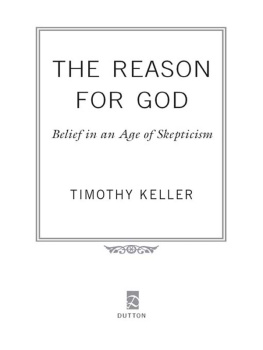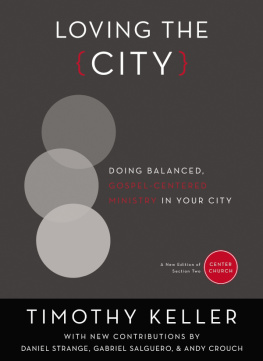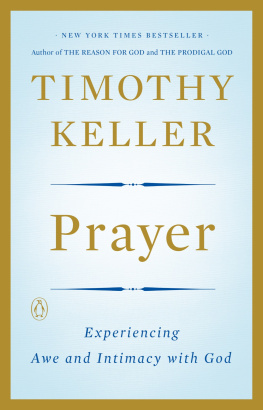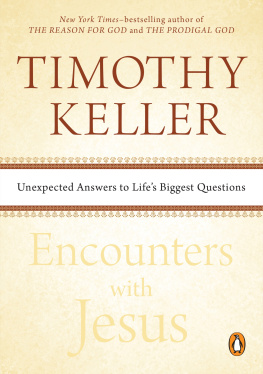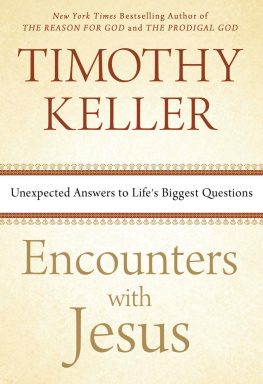The Grieving Sisters
Also by Timothy Keller
The Reason for God: Belief in an Age of Skepticism
The Prodigal God: Recovering the Heart of the Christian Faith
Counterfeit Gods: The Empty Promises of Money, Sex, and Power, and the Only Hope That Matters
Generous Justice: How Gods Grace Makes Us Just
Kings Cross: The Story of the World in the Life of Jesus
The Meaning of Marriage: Facing the Complexities of Commitment with the Wisdom of God
Center Church: Doing Balanced, Gospel-Centered Ministry in Your City
Every Good Endeavor: Connecting Your Work to Gods Work
The Encounters with Jesus eSeries
The Skeptical Student
The Insider and the Outcast

The Grieving Sisters
The Encounters with Jesus Series
III
Timothy Keller

DUTTON
Published by the Penguin Group
Penguin Group (USA) Inc., 375 Hudson Street,
New York, New York 10014, USA

USA / Canada / UK / Ireland / Australia / New Zealand / India / South Africa / China
Penguin Books Ltd, Registered Offices: 80 Strand, London WC2R 0RL, England
For more information about the Penguin Group visit penguin.com.
Published by Dutton, a member of Penguin Group (USA) Inc.
First Special printing, January 2013
Copyright 2013 by Timothy Keller
All rights reserved. No part of this book may be reproduced, scanned, or distributed in any printed or electronic form without permission. Please do not participate in or encourage piracy of copyrighted materials in violation of the authors rights. Purchase only authorized editions.
All Bible references are from the New International Version (NIV), unless otherwise noted.
E-book ISBN 978-1-101-61444-0
While the author has made every effort to provide accurate telephone numbers, Internet addresses, and other contact information at the time of publication, neither the publisher nor the author assumes any responsibility for errors or for changes that occur after publication. Further, the publisher does not have any control over and does not assume any responsibility for author or third-party websites or their content.

The Encounters with Jesus Series is an attempt to look at the big questions that each of us needs to answer, simply in order to live our daily lives. Who are we as human beings? Whats wrong with us? Whats wrong with the whole world? What, if anything, can put us right? Unless you have some working answers to those questions you really cannot decide what things are worth spending your life on. For now, lets focus on one question in particular, What can put us right? Almost no one argues that the world is just fine as it is and that there is nothing wrong with the human race. So what can change our condition? If you are looking for the Christian answer to that major philosophical question, then you have to change the question a little bit. The right question is, Who can put us right? And the answer, Christians believe, is Jesus. So lets look at him. Who is this figure at the center of Christianity whos supposed to put everything right?
To do that were going to look at the Gospel of John, which tells the story of Jesus and his relationship with two sisters, Mary and Martha, and their brother, Lazarus. Early in chapter 11, Lazarus is called someone whom Jesus loved. That is a term in the Gospels used to describe Jesus relationship to his most intimate disciples. Apparently, Jesus, Lazarus, Mary, and Martha thought of themselves as practically family.
The Gospel account tells us that Lazarus became extremely sick and his life hung in the balance. Mary and Martha sent for Jesus, but before he arrived, Lazarus died. When Jesus finally came to his friends home, all were in mourning, and Lazarus body was already in the tomb. What Jesus did next is one of the most famous incidents in history. It is also one of the most revealing, showing us not only who Jesus is but also what he came to do.
On his arrival, Jesus found that Lazarus had already been in the tomb for four days. Now Bethany was less than two miles from Jerusalem, and many Jews had come to Martha and Mary to comfort them in the loss of their brother. When Martha heard that Jesus was coming, she went out to meet him, but Mary stayed at home.
Lord, Martha said to Jesus, if you had been here, my brother would not have died. But I know that even now God will give you whatever you ask.
And Jesus said to her, Your brother will rise again.
Martha answered, I know he will rise again in the resurrection at the last day.
And Jesus said to her, I am the resurrection and the life. The one who believes in me will live, even though they die; and whoever lives by believing in me will never die. Do you believe this?
Yes, Lord, she replied, I believe that you are the Messiah, the Son of God, who is to come into the world.
After she had said this, she went back and called her sister Mary aside. The Teacher is here, she said, and is asking for you. When Mary heard this, she got up quickly and went to him. Now Jesus had not yet entered the village, but was still at the place where Martha had met him. When the Jews who had been with Mary in the house, comforting her, noticed how quickly she got up and went out, they followed her, supposing she was going to the tomb to mourn there.
When Mary reached the place where Jesus was and saw him, she fell at his feet and said, Lord, if you had been here, my brother would not have died.
When Jesus saw her weeping, and the Jews who had come along with her also weeping, he was deeply moved in spirit and troubled. Where have you laid him? he asked.
Come and see, Lord, they replied.
Jesus wept.
Then the Jews said, See how he loved him! (John 11:1736)
Martha comes to Jesus and says, Lord, if you had been here my brother would not have died. Just moments later, Mary comes out and says the same thing, verbatim. Two sisters, same situation, exactly the same words. But strikingly, Jesus responses are sharply different. When Martha speaks he almost argues with her. Her message is, You came too late, but Jesus replies, I am the resurrection and the life! With me its never too late. The flow of her heart is toward despair, but Jesus is pushing against that flow. Hes rebuking her doubt and giving her hope. Then he sees Mary, who says exactly the same thing, but this time his response is the complete opposite. He doesnt argue; in fact hes practically speechless. And instead of pushing against the flow of her hearts sadness, he enters it. He stands alongside her in her grief. He bursts into tears and can say only, Where is he? Now these radically divergent responses by Jesus are more than simply a counterintuitive curiosity. They point not only to Jesus profound relational wisdom, but to an even deeper truth about his character and his identity.
Imagine that you were making up a story about a divine being who had come to earth in disguise as a human being. In the story, this divine being arrives at the funeral of a friend, knowing that he has the power to raise his dead friend to life and that he is about to wipe away all the mourners tears in the space of a few minutes. What would be this persons most likely inner emotional state? Surely you would depict him as smiling, excited, even playful. Youd expect him to be rubbing his hands with anticipation, saying under his breath, Wait until you all see what Im about to do! Or perhaps you as the storywriter would just keep him speaking in a high and elevated tone: I am the resurrection and the life. Both of those reactions would seem to be in character for someone who claims to be divine. But we would never imagine that such a divine person would get sucked into Marys agony and just stand there weeping. Why would he be so strong one minute and so vulnerable the next?





